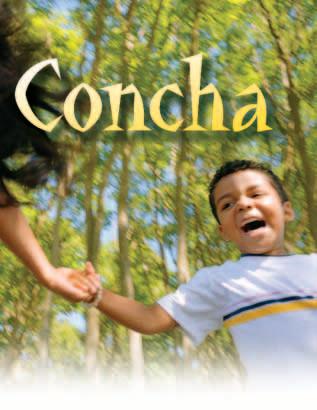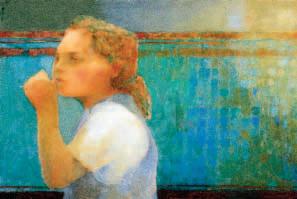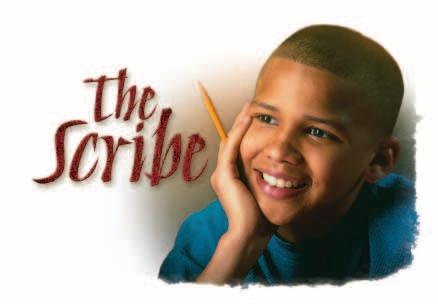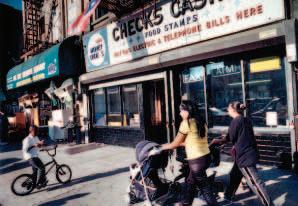Glencoe Short Stories 1 1st Edition
Jeffrey D. Wilhelm Et Al
Visit to download the full and correct content document: https://ebookmass.com/product/glencoe-short-stories-1-1st-edition-jeffrey-d-wilhelm-e t-al/



Program Consultants
Jeffrey D. Wilhelm, PhD
Douglas Fisher, PhD
Kathleen A. Hinchman, PhD
David O’Brien, PhD
Taffy Raphael, PhD
Cynthia Hynd Shanahan, EdD
* Titles or authors here and in the body of the book are interrelatedly linked.
 by Judith Viorst
by Judith Viorst


Dear Richard,
Don’t invite me to your birthday party because I’m not coming. And give back the Disneyland sweatshirt I said you could wear. If I’m not good enough to play on your team, I’m not good enough to be friends with.
Your former friend, Janet
P.S. I hope when you go to the dentist he finds twenty cavities. 1
Dear Janet,
Here is your stupid Disneyland sweatshirt, if that’s how you’re going to be. I want my comic books now—finished or not. No girl has ever played on the Mapes Street baseball team, and as long as I’m captain, no girl ever will.
Your former friend, Richard
P.S. I hope when you go for your checkup you need a tetanus1 shot . 2
Practice the Skills
1 Comparing Literature
Author’s Purpose
In this selection, the author uses letters from Richard and Janet to tell the story. Why do you think the author does this? Does it make the story more entertaining? How do the letters support the author’s purpose? In your Author’s Purpose chart, write “use of letters” under the author’s purpose that you selected.
2 Comparing Literature
Author’s Purpose
former (FOR mer) adj. earlier cavities (KAV ih teez) n. hollow spaces in a tooth caused by decay
This letter shows you how Richard feels about having girls on a baseball team. Do you think the author agrees with Richard? Do you think the author might be trying to persuade or convince readers of something? If so, write a note in the Persuade box of the Author’s Purpose chart.
Dear Richard,
I’m changing my goldfish’s name from Richard to Stanley. Don’t count on my vote for class president next year. Just because I’m a member of the ballet club doesn’t mean I’m not a terrific ballplayer.
Your former friend, Janet
P.S. I see you lost your fi rst game, 28–0.
Dear Janet,
I’m not saving any more seats for you on the bus. For all I care you can stand the whole way to school. Why don’t you forget about baseball and learn something nice like knitting?
Your former friend,
Richard
P.S. Wait until Wednesday.
Dear Richard,
My father said I could call someone to go with us for a ride and hot-fudge sundaes. In case you didn’t notice, I didn’t call you.
Your former friend, Janet
P.S. I see you lost your second game, 34-0.
Dear Janet,

M
Practice the Skills
Remember when I took the laces out of my blue-and-white sneakers and gave them to you? I want them back.
Your former friend, Richard
P.S. Wait until Friday.
Dear Richard,
Congratulations on your unbroken record. Eight straight losses, wow! I understand you’re the laughingstock of New Jersey. 3
Your former friend, Janet
P.S. Why don’t you and your team forget about baseball and learn something nice like knitting maybe.
Vocabulary
laughingstock (LAF ing STOK) n. a person or thing that is made fun of
3 English Language Coach
Word References Use a thesaurus or dictionary to find a word or phrase that means about the same as laughingstock. Then test the word or phrase by reading it instead of laughingstock in Janet’s letter.
Dear Janet,
Here’s the silver horseback-riding trophy that you gave me. I don’t think I want to keep it anymore.
Your former friend,
Richard
P.S. I didn’t think you’d be the kind who’d kick a man when he’s down. 2
Dear Richard,
I wasn’t kicking exactly. I was kicking back.
Your former friend,
Janet
P.S. In case you were wondering, my batting average is .345.
Dear Janet,
Alfie is having his tonsils3 out tomorrow. We might be able to let you catch next week. 4
Richard
Dear Richard, I pitch.
Janet
Dear Janet,
Joel is moving to Kansas and Danny sprained his wrist. How about a permanent place in the outfield?
Richard
Dear Richard, I pitch.
Janet
Dear Janet,
Ronnie caught the chicken pox and Leo broke his toe and Elwood has these stupid violin lessons. I’ll give you first base, and that’s my final offer.
Richard
Practice the Skills
4 Comparing Literature

2. If you kick a man when he’s down, you are being mean to someone who has already had bad things happen to him.
3. Tonsils are small organs in the throat near the back of the mouth. Sometimes doctors perform surgery to remove them.

Author’s Purpose Richard is starting to change his mind about letting girls play on the team. Why is he changing his mind? Does this tell you anything about one of the author’s purposes for this story? If so, write a note in your chart.
Dear Richard,
Susan Reilly plays first base, Marilyn Jackson catches, Ethel Kahn plays center field, I pitch. It’s a package deal.5
Janet
P.S. Sorry about your 12-game losing streak.
Dear Janet, Please! Not Marilyn Jackson. Richard
Dear Richard,
Nobody ever said that I was unreasonable. How about Lizzie Martindale instead?
Janet
Dear Janet,
At least could you call your goldfish Richard again? 5
Your friend, Richard ❍
5. A package deal is an offer that includes several items. Whoever agrees to the deal must take all of the items.

Practice the Skills
5
Did you enjoy reading “The Southpaw”? Explain why or why not. Write your answer on the “Southpaw” page of Foldable 1. Your response will help you complete the Unit Challenge later.

 Wby Mary H elen P once M ary H elen P once
Wby Mary H elen P once M ary H elen P once


hi le growing up in the small barrio1 of Pacoima,2 my younger brother Joey and I were left alone to fi nd ways para divertirnos, 3 to keep ourselves busy—and out of our mother’s way. One way in which we whiled away long summer days was by making pea shooters. These were made from a hollow reed which we first cleaned with a piece of wire. We then collected berries from los pirules, 4 t he pepper trees that lined our driveway. Once we amassed enough dry berries we put them in our mouths and spat them out at each other through the pea shooter. 1
1. A barrio is a neighborhood of Spanish-speaking people.
2. Pacoima (PAW koh EE maw) is a community in Los Angeles, California.
3. Pa ra divertirnos (PAH rah dee vair TEER nohs) means “to amuse ourselves” in Spanish, or, as the speaker in the story says, “to keep ourselves busy.”
4. Los pirules (lohs pee ROO lays) is Spanish for “the pepper trees.”
Vocabulary
amassed (uh MAST) v. piled up, collected, or gathered a great quantity of something
1 Comparing Literature
Author’s Purpose Start taking notes in the “Concha” chart you made in your Learner’s Notebook. Does the first paragraph give clues about the author’s purpose in writing this story? Does the author seem to want to entertain, persuade, inform, or express her feelings?
T he berries had a terrible taste—they were even said to be poison! I was most careful not to swallow them. We selected only the hard, firm peas. The soft ones, we knew, would get mushy, crumble in our mouths and force us to gag—and lose a fight. During an important battle a short pause could spell defeat.5 Of tentimes while playing with Joey I watched closely. When he appeared to gag I dashed back to the pepper tree to load up on ammunition. I pelted him without mercy until he begged me to stop.
“No more. Ya no,” Joey cried as he bent over to spit berries. “No more!”
“Ha, ha I got you now.” I spat berries at Joey until, exhausted, we called a truce and slumped onto a wooden bench. 2 3
In fall our game came to a halt—the trees dried up; the berries fell to the ground. This was a sign for us to begin other games.
Our games were seasonal. During early spring we made whistles from the long blades of grass that grew in the open field behind our house. In winter we made dams, forts and canals from the soft mud that was our street. We tied burnt matchsticks together with string. These were our men. We positioned them along the forts (camouflaged with small branches). We also played kick the can, but our most challenging game was playing with red ants.
5. When you say something could spell defeat, you mean that it could result in defeat.
Vocabulary
pelted (P EL tid) v. struck over and over again
Practice the Skills
2 Comparing Literature
Author’s Purpose
These paragraphs tell more about the peashooter fights. What details hint at the author’s purpose? Write them in your chart.
3 English Language Coach
Word References
Work with a classmate. Use a dictionary to find the meaning of truce while your partner uses a thesaurus. Compare your findings.

The ants were of the common variety: red, round and treacherous. They invaded our yard and the llano6 every summer. We always knew where ants could be found, donde habia hormigas.7 We liked to build mud and grass forts smack in the middle of ant territory. The ants were the enemy, the matchstickmen the heroes, or good guys.
Playing with ants was a real challenge! While placing our men in battle positions we timed it so as not to get bitten. We delighted in beating the ants at their own game.

Sometimes we got really brave and picked up ants with a stick, then twirled the stick around until the ants got dizzy-drunk (or so we thought)—and fell to the ground. We made ridges of dirt and pushed the ants inside, covered them with dirt and made bets as to how long it would take them to dig their way out.
Concha, my best friend and neighbor, was quite timid at school. She avoided all rough games such as kickball and Red Rover. When it came to playing with ants however, Concha held first place for bravery. She could stand with her feet atop an anthill for the longest time! We stood trembling as ants crawled up our shoes, then quickly stomped our feet to scare them off. But Concha never lost her nerve. 4
One time we decided to have an ant contest. The prize was a candy bar—a Sugar Daddy sucker. We first found an anthill, lined up, then took turns standing beside the anthill while the juicy red ants climbed over our shoes. We dared not move— but when the first ant moved towards our ankles we stomped away, our Oxfords making swirls of dust that allowed us to retreat to the sidelines. But not Concha. She remained in place as big red ants crept up her shoes. One, five, ten! We stood and counted, holding our breath as the ants continued to climb. Fifteen, twenty! Twenty ants were crawling over Concha! 5
6. Llano (YAH noh) is the Spanish word for “flat ground.”
7. D onde habia hormigos (DOHN day ah BEE ah or MEE gohs) means “where ants lived.”
La Nina del Chupetin. Graciela Genoves (b. 1962). Zurbaran Galeria, Buenos Aires, Argentina.
Analyzing the Art What feeling do you get from this picture? Is it similar to the feeling you get from reading the story? Explain.
Practice the Skills
4 English Language Coach
5 English Language Coach
Word References Look up retreat in a dictionary. What did everyone except Concha do?
Word References Do you know any other words for timid? List them in your Learner’s Notebook. Then look up timid in a thesaurus. List any new synonyms (words that mean the same thing) you find there. Vocabulary
“Ujule, 8 she sure ain’t scared,” cried Mundo in a hushed voice. “No le tiene miedo a las hormigas.”9
“Uhhhhh,” answered Beto, his eyes wide.
“. . . I mean for a girl,” added Mundo as he poked Beto in the ribs. We knew Beto liked Concha—and always came to her rescue.
We stood and counted ants. We were so caught up in this feat that we failed to notice the twenty-first ant that climbed up the back of Concha’s sock . . . and bit her!
“Ay, ay, ay,” screeched Concha.

Children’s Games, 1959. Rufino Tamayo. Oil on canvas. The Metropolitan Museum of Art, New York.
“Gosh, she’s gonna die,” cried an alarmed Virgie as she helped stomp out ants. “She’s gonna die!”
“She’s too stupid to die,” laughed Mundo, busy brushing ants off his feet. “She’s too stupid.”
“But sometimes people die when ants bite them,” insisted Virgie, her face pale. “They gets real sick.”
“The ants will probably die,” Mundo snickered, holding his stomach and laughing loudly. “Ah, ha, ha.”
“Gosh you’re mean,” said a shocked Virgie, hands on hips. “You are so mean.”
“Yeah, but I ain’t stupid.” 6
“Come on you guys, let’s get her to the mangera,”10 Beto cried as he reached out to Concha who by now had decided she would live. “Come on, let’s take her to the faucet.”
We held Concha by the waist as she hobbled11 to the water faucet. Her cries were now mere12 whimpers as no grownup had come out to investigate. From experience we knew that if a first cry did not bring someone to our aid we should stop crying—or go home.
8. Ujule (oo HOO lay) is a Spanish exclamation that means something like “Oh my!” or “Wow!”
9. No le tiene miedo (noh lay TYEH nay mee AY doh) a las hormigas means “She’s not afraid of the ants.”
10. Mangera (mahn HAY raw) is Spanish for “faucet.”
11. Hobbled means “walked with a limp.”
12. Mere is another word for “only” or “nothing more than.”
Vocabulary
feat (feet) n. an act that shows skill, strength, or courage
Analyzing the Art Does this picture look to you like children playing games? Explain why or why not.
Practice the Skills
6 Comparing Literature
Author’s Purpose Reread the page up to this point. What clues do you see about the author’s purpose? Look especially at the sentences “She’s too stupid to die” and “The ants will probably die.” Based on those sentences, is the author trying to entertain, to persuade, to explain, or to express feelings? Explain your answer.
We helped Concha to the faucet, turned it on and began to mix water with dirt. We knew the best remedy for insect bites was lodo.13 We applied mud to all bug stings to stop the swelling. Mud was especially good for wasp stings, the yellowjackets we so feared—and from which we ran away at top speed. Whenever bees came close we stood still until they flew away, but there were no set rules on how to get rid of avispas.14 We hit out at them, and tried to scare them off but the yellowjackets were fierce! In desperation15 we flung dirt at them, screamed and ran home.

Visual Vocabulary
Jacks is a game in which the object is to pick up a number of small, six-pointed metal pieces while bouncing and catching a small rubber ball with the same hand.
Not long after the ant incident Concha decided she was not about to run when a huge wasp broke up our game of jacks. She stood still, so still the wasp remained on her dark head for what seemed like hours. We stood and watched, thinking perhaps the wasp had mistaken Concha’s curly hair for a bush! We watched—and waited.
“Ujule, she sure is brave,” exclaimed Virgie as she sucked on a popsicle. “She sure is brave.”
“She’s stupid,” grunted Mundo, trying to be indifferent. “She’s just a big show-off who thinks she’s so big.” 7
“So are you,” began Virgie, backing off. “So are you.”
“Yeah? Ya wanna make something outta it?”
“Let’s go,” interrupted Beto in his soft voice.
“Ya vamonos.”16 He smiled at Concha—who smiled back.
In time the wasp flew away. Concha immediately began to brag about how a “real big wasp” sat on her hair for hours. She never mentioned the ant contest—nor the twenty-first ant that led her to el lodo. 8 9 ❍
Practice the Skills
13. Lodo (LOH doh) means “mud.”
14. Avispas (ah VEES pahs) are wasps.
15. When you do something in desperation, you have usually run out of ideas about what to do.
16. Ya vamonos (yah VAH moh nohs) means “Let’s go.”
Vocabulary
incident (I N suh dunt) n. an event or situation
7 English Language Coach
Word References Do you know what indifferent means? Look up this word in a dictionary or thesaurus. Then explain its meaning to a partner.
8 Comparing Literature
Author’s Purpose
The selection ends with a story about Concha and a huge wasp. Talk with a partner about the story. Discuss its effect on you. Did you enjoy it? In your chart, add any details from the end of the story that give clues about the author’s purpose.
9 What kinds of books or magazines do you think the kids in this story might have liked to read? Write your answer on the “Concha” page of Foldable 1. Your response will help you complete the Unit Challenge later.

We been l iving in the apartment over the Silver Dollar Check Cashing Service five years. But I never had any reason to go in there till two days ago, when Mom had to go to the Wash-a-Mat and asked me to get some change.
And man! Are those people who come in there in some bad shape.
Old man Silver and old man Dollar, who own the place, have signs tacked up everywhere:
NO LOUNGING, NO LOITERING1 THIS IS NOT A WAITING ROOM and
MINIMUM CHECK CASHING FEE, 50¢ and LETTERS ADDRESSED, 50¢ and LETTERS READ, 75¢ and LETTERS WRITTEN, ONE DOLLAR
A nd everybody who comes in there to cash a check gets their picture taken like they’re some kind of criminal.
After I got my change, I stood around for a while digging the action. First comes an old lady with some kind of long form to fill out. The mean old man behind the counter points to the “One Dollar” sign. She nods. So he starts to fill it out for her.
“Name?”
“Muskogee Marie Lawson.”
“SPELL it!” he hollers.
“M, m, u, s—well, I don’t exactly know, sir.”
“I’ll put down ‘Marie,’ then. Age?”
“Sixty-three my last birthday.”
“Date of birth?”
“March twenty-third”—a pause—“I think, 1900.”
“Look, Marie,” he says, which makes me mad, hearing him first-name a dignified old gray-haired lady like that, “if you’d been born in 1900, you’d be seventy-two. Either I put that down, or I put 1910.”
“Whatever you think best, sir,” she says timidly.

He sighs, rolls his eyes to the ceiling, and bangs his fist on the form angrily. Then he fills out the rest.
“One dollar,” he says when he’s fi nished. She pays like she’s grateful to him for taking the trouble.
Next is a man with a cane, a veteran 2 who has to let the government know he moved. He wants old man Silver to do this for him, but he doesn’t want him to know he can’t do it himself.
“My eyes are kind of bad, sir. Will you fill this thing out for me? Tell them I moved from 121 South 15th Street to 203 North Decatur Street.”
Old man Silver doesn’t blink an eye. Just fills out the form, and charges the crippled man a dollar.
And it goes on like that. People who can’t read or write or count their change. People who don’t know how to pay their gas bills, don’t know how to fill out forms, don’t know how to address envelopes. And old man Silver and old man Dollar cleaning up on all of them. It’s pitiful. It’s disgusting. Makes me so mad I want to yell.
And I do, but mostly at Mom. “Mom, did you know there are hundreds of people in this city who can’t read and write?”
Mom isn’t upset. She’s a wise woman. “Of course, James,” she says. “A lot of the older people around here haven’t had your advantages. They came from down South, and they had to quit school very young to go to work.
“In the old days, nobody cared whether our people got an education. They were only interested in getting the crops in.” She sighed. “Sometimes I think they still don’t
2. A veteran (VEH tuh run) is someone who has served in the armed services.
care. If we hadn’t gotten you into that good school, you might not be able to read so well either. A lot of boys and girls your age can’t, you know.”
“But that’s awful!” I say. “How do they expect us to make it in a big city? You can’t even cross the streets if you can’t read the ‘Walk’ and ‘Don’t Walk’ signs.”
“It’s hard,” Mom says, “but the important thing to remember is it’s no disgrace. There was a time in history when nobody could read or write except a special class of people.”
And Mom takes down her Bible. She has three Bible study certificates and is always giving me lessons from Bible history. I don’t exactly go for all the stuff she believes in, but sometimes it is interesting.
“In ancient times,” she says, “no one could read or write except a special class of people known as scribes.3 It was their job to write down the laws given by the rabbis
and the judges.4 No one else could do it.
“Jesus criticized the scribes,” she goes on, “because they were so proud of themselves. But he needed them to write down his teachings.”
“Man,” I said when she fi nished, “that’s something.”
My mind was working double time. I’m the best reader and writer in our class. Also it was summertime. I had nothing much to do except go to the park or hang around the library and read till my eyeballs were ready to fall out, and I was tired of doing both.
So the next morning, after my parents went to work, I took Mom’s card table and a folding chair down to the sidewalk. I lettered a sign with a Magic Marker, and I was in business. My sign said:
PUBLIC SCRIBE—ALL SERVICES FREE
I set my table up in front of the Silver Dollar and waited for business. Only one thing bothered me. If the people couldn’t read, how would they know what I was there for?
But five minutes had hardly passed when an old lady stopped and asked me to read her grandson’s letter. She explained that she had just broken her glasses. I knew she was fibbing, but I kept quiet.
I read the grandson’s letter. It said he was having a fi ne time in California but was a
4. The rabbis and the judges were the teachers and rulers of the ancient Hebrews. 3. Scr ibes were educated people who served as copyists, editors, and teachers.l ittle short. He would send her some money as soon as he made another payday. I handed the letter back to her.
“Thank you, son,” she said, and gave me a quarter.
I handed that back to her too.
The word got around. By noontime I had a whole crowd of customers around my table. I was kept busy writing letters, addressing envelopes, filling out forms, and explaining official-looking letters that scared people half to death.
I didn’t blame them. The language in some of those letters—“Establish whether your disability is one-fourth, one-third, one-half, or total, and substantiate5 in paragraph 3 (b) below”—would upset anybody. I mean, why can’t the government write English like everybody else?
Most of my customers were old, but there were a few young ones too. Like the girl who had gotten a letter about her baby from the Health Service and didn’t know what “immunization”6 meant.
At noontime one old lady brought me some iced tea and a peach, and another gave me some fried chicken wings. I was really having a good time when the shade of all the people standing around me suddenly vanished. The sun hit me like a ton of hot bricks.
Only one long shadow fell across my table. The shadow of a tall, heavy, blue-eyed cop. In our neighborhood, when they see a cop, people scatter. That was why the back of my neck was burning.
“What are you trying to do here, sonny?” the cop asks.
5. When you substantiate something, you give evidence to prove a claim.
6. An immunization (im yuh nuh ZAY shun) is medicine given to protect against disease.
“Help people out,” I tell him calmly, though my knees are knocking together under the table.
“Well, you know,” he says, “Mr. Silver and Mr. Dollar have been in business a long time on this corner. They are very respected men in this neighborhood. Are you trying to run them out of business?”
“I’m not charging anybody,” I pointed out.
“That,” the cop says, “is exactly what they don’t like. Mr. Silver says he is glad to have some help with the letter writing. Mr. Dollar says it’s only a nuisance7 to them anyway and takes up too much time. But if you don’t charge for your services, it’s unfair competition.”
Well, why not? I thought. After all, I could use a little profit.
“All right,” I tell him. “I’ll charge a quarter.”
“Then it is my duty to warn you,” the cop says, “that it’s against the law to conduct a business without a license. The first time you accept a fee, I’ll close you up and run you off this corner.”
He really had me there. What did I know about licenses? I’m only thirteen, after all. Suddenly I didn’t feel like the big black businessman anymore. I felt like a little kid who wanted to holler for his mother. But she was at work, and so was Daddy.
“I’ll leave,” I said, and did, with all the cool I could muster. But inside I was burning up, and not from the sun.
One little old lady hollered “You big bully!” and shook her umbrella at the cop. But the rest of those people were so beaten down they didn’t say anything. Just
7. A nui sance (NOO sunts) is something that is annoying or unpleasant.
shuffled back on inside to give Mr. Silver and Mr. Dollar their hard-earned money like they always did.
I was so mad I didn’t know what to do with myself that afternoon. I couldn’t watch TV. It was all soap operas anyway, and they seemed dumber than ever. The library didn’t appeal to me either. It’s not air-conditioned, and the day was hot and muggy.
Fi nally I went to the park and threw stones at the swans in the lake. I was careful not to hit them, but they made good targets because they were so fat and white. Then after a while the sun got lower. I kind of cooled off and came to my senses. They were just big, dumb, beautiful birds and not my enemies. I threw them some crumbs from my sandwich and went home.
“Daddy,” I asked that night, “how come you and Mom never cash checks downstairs in the Silver Dollar?”
“Because,” he said, “we have an account at the bank, where they cash our checks free.”
“Well, why doesn’t everybody do that?” I wanted to know.
“Because some people want all their money right away,” he said. “The bank insists that you leave them a minimum balance.”
“How much?” I asked him.
“Only five dollars.”
“But that five dollars still belongs to you after you leave it there?”
“Sure,” he says. “And if it’s in a savings account, it earns interest.”
“So why can’t people see they lose money when they pay to have their checks cashed?”
“A lot of our people,” Mom said, “are scared of banks, period. Some of them remember the Depression,8 when all the banks closed and the people couldn’t get their money out. And others think banks are only for white people. They think they’ll be insulted, or maybe even arrested, if they go in there.”
Wow. The more I learned, the more pitiful it was. “Are there any black people working at our bank?”
“There didn’t used to be,” Mom said, “but now they have Mr. Lovejoy and Mrs. Adams. You know Mrs. Adams, she’s nice. She has a daughter your age.”
“Hmmm,” I said, and shut up before my folks started to wonder why I was asking all those questions.
The next morning, when the Silver Dollar opened, I was right there. I hung around near the door, pretending to read a copy of Jet magazine.
“Psst,” I said to each person who came in. “I know where you can cash checks free.”
It wasn’t easy convincing them. A man blinked his red eyes at me like he didn’t believe he had heard right. A carpenter with tools hanging all around his belt said he was on his lunch hour and didn’t have time. And a big fat lady with two shopping bags pushed past me and almost knocked me down, she was in such a hurry to give Mr. Silver and Mr. Dollar her money.
But fi nally I had a little group who were interested. It wasn’t much. Just three people. Two men—one young, one old—and the little old lady who’d asked me to read her the letter from California. Seemed the
8. The Depression, or Great Depression, was a period of high unemployment from 1929 through the 1930s.
grandson had made his payday and sent her a money order.
“How far is this place?” asked the young man.
“Not far. Just six blocks,” I told him.
“Aw shoot. I ain’t walking all that way just to save fifty cents.”

So then I only had two. I was careful not to tell them where we were going. When we fi nally got to the Establishment Trust National Bank, I said, “This is the place.”
“I ain’t goin’ in there,” said the old man. “No sir. Not me. You ain’t gettin’ me in there.” And he walked away quickly, going back in the direction where we had come.
To tell the truth, the bank did look kind of scary. It was a big building with tall white marble pillars. A lot of Brink’s armored trucks and Cadillacs were parked out front. Uniformed guards walked back and forth inside with guns. It might as well have a “Colored Keep Out” sign.
Whereas the Silver Dollar is small and dark and funky and dirty. It has trash on the floors and tape across the broken windows.
I looked at the little old lady. She smiled back bravely. “Well, we’ve come this far, son,” she said. “Let’s not turn back now.”
So I took her inside. Fortunately Mrs. Adams’s window was near the front.
“Hi, James,” she said.
“I’ve brought you a customer,” I told her.
Mrs. Adams took the old lady to a desk to fill out some forms. They were gone a long time, but fi nally they came back.
“Now, when you have more business with the bank, Mrs. Franklin, just bring it to me,” Mrs. Adams said.
“I’ll do that,” the old lady said. She held out her shiny new bankbook. “Son, do me a favor and read that to me.”
“Mrs. Minnie Franklin,” I read aloud. “July 9, 1972. Thirty-seven dollars.”
“That sounds real nice,” Mrs. Franklin said. “I guess now I have a bankbook, I’ll have to get me some glasses.”
Mrs. Adams winked at me over the old lady’s head, and I winked back.
“Do you want me to walk you home?” I asked Mrs. Franklin.
“No thank you, son,” she said. “I can cross streets by myself all right. I know red from green.”
And then she winked at both of us, letting us know she knew what was happening.
“Son,” she went on, “don’t ever be afraid to try a thing just because you’ve never done it before. I took a bus up here from Alabama by myself forty-four years ago. I ain’t thought once about going back. But I’ve stayed too long in one neighborhood since I’ve been in this city. Now I think I’ll go out and take a look at this part of town.”
Then she was gone. But she had really started me thinking. If an old lady like that wasn’t afraid to go in a bank and open an account for the first time in her life, why should I be afraid to go up to City Hall and apply for a license?
Wonder how much they charge you to be a scribe? ❍

People are always saying, “Nothing’s worse than when a kid goes bad.” Well, let me tell you, going good isn’t all that great either. Tell you what I mean.
Back in sixth grade there was a bunch of us who liked nothing better than doing bad stuff. I don’t know why. We just liked doing it. And the baddest of the bad was Matt Kaizer. 1
Matt was a tall, thin kid with long, light blond hair that reached his shoulders. He was twelve years old—like I was. His eyes were pale blue and his skin was a vanilla cream that never—no matter the season—seemed to darken, except with dirt. What with the way he looked—so pale and all—plus the fact that he was into wearing extra large blank white T-shirts that reached his knees, we called him “Spirit.”
Now, there are two important things you need to know about Matt Kaizer. The first was that as far as he was concerned there was nothing good about him at all. Nothing. The second thing was that his father was a minister.
Our gang—I’m Marley, and then there was Chuck, Todd, and Nick—loved the fact that Matt was so bad and his father a minister. You know, we were always daring him to do bad
Practice the Skills
1 Comparing Literature
Character Create a Character Chart for Matt like the one you made for Paul. As you read, fill in clues to Matt’s character. Then write a note for each clue that explains what you learned about Matt from that clue.
t hings. “Hey, minister’s kid!” we’d taunt. “Dare you to . . .” and we’d challenge him to do something, you know, really gross. Thing is, we could always count on Matt—who wanted to show he wasn’t good—to take a dare.
For instance: Say there was some dead animal out on the road. We’d all run to Matt and say, “Dare you to pick it up.”
Matt would look at it—up close and personal—or more than likely poke it with a stick, then pick it up and fling it at one of us.
Disgusting stories? Someone would tell one and then say, “Dare you to tell it to Mary Beth Bataky”—the class slug— and Matt would tell it to her—better than anyone else, too.
TV and movies? The more blood and gore there was, the more Matt ate it up—if you know what I mean. MTV, cop shows, all that bad stuff, nothing was too gross for him.
And it didn’t take just dares to get Matt going. No, Matt would do stuff on his own. If anyone blew a toot—even in class—he would bellow, “Who cut the cheese?” He could belch whenever he wanted to, and did, a lot. Spitballs, booger flicking, wedgie yanking, it was all wicked fun for Matt. No way was he going to be good! Not in front of us. 2
Now, his father, the minister, “Rev. Kaizer” we called him, wasn’t bad. In fact just the opposite. The guy was easygoing, always dressed decently, and as far as I knew, never raised his voice or acted any way than what he was, a nice man, a good man. Sure, he talked a little funny, like he was reading from a book, but that was all.
Did Matt and his father get along? In a way. For example, once I was with Matt after he did something bad—I think he blew his nose on someone’s lunch. Rev. Kaizer had learned about it. Instead of getting mad he just gazed at Matt, shook his head, and said, “Matt, I do believe there’s goodness in everyone. That goes for you too. Someday you’ll fi nd your own goodness. And when you do you’ll be free.”
Vocabulary
Practice the Skills
2 Comparing Literature
Character These paragraphs give you several clues about Matt’s character. For example, they tell you how Matt acted around other people, and how Matt wanted to act. In your Character Chart, write at least two clues you found to Matt’s character in these paragraphs. Then write notes about what you learned from these clues.

taunt (tawnt) v. to try to anger someone by teasing him or her
Analyzing the Photo
In what ways does the boy in this photo fi t the description of Matt Kaizer?
“I’m not good,” Matt insisted.
“Well, I think you are,” his father said, patiently. Matt grinned. “Long as my friends dare me to do bad things, I’ll do ’em.”
“Never refuse a dare?” his father asked, sadly.
“Never,” Matt said with pride.
Rev. Kaizer sighed, pressed his hands together, and looked toward heaven.
So there we were, a bunch of us who knew we were bad and that it was doing bad things that held us together. And the baddest of the bad, like I said, was Matt—the Spirit— Kaizer. But then . . . oh, man, I’ll tell you what happened.
One day after school we were hanging out in the playground. The five of us were just sitting around telling disgusting stories, when suddenly Chuck said, “Hey, hear about Mary Beth Bataky?”
“What about her?” Matt asked.
“Her old man’s dying.”
Right away Matt was interested. “Really?”
“It’s true, man,” Chuck insisted. “He’s just about had it.”
“How come?” I asked.
“Don’t know,” said Chuck. “He’s sick. So sick they sent him home from the hospital. That’s why Mary Beth is out. She’s waiting for him to die.”
“Cool,” said Matt. 3
Now, Mary Beth was one small straw of a sad slug. She had this bitsy face with pale eyes and two gray lines for lips all framed in a pair of frizzy braids. Her arms were thin and always crossed over her chest, which was usually bundled in a brown sweater. The only bits of color on her were her fi ngernails, which, though chewed, were spotted with bright red nail polish—chipped.
So when we heard what was going on with Mary Beth and her father, we guys eyed one another, almost knowing what was going to happen next. But, I admit, it was me who said, “Hey, Spirit, I dare you to go and see him.”
Matt pushed the blond hair out of his face and looked at us with those pale blue, cool-as-ice eyes of his.
“Or maybe,” Todd said, “you’re too chicken, being as you’re a minister’s kid and all.”
Practice the Skills
3 Comparing Literature Character Think about how Matt reacts when he learns that the father of one of the kids in his class is dying. Write down how he reacts in the clues column of your Character Chart. Is Matt just being cool? Or is he being cruel? Write down what this clue tells you in your chart.
T hat did it. Course it did. No way Matt could resist a dare. He got up, casual like. “I’ll do it,” he said. “Who’s coming with me?” 4
To my disgust the other guys backed off. But I accepted. Well, actually, I really didn’t think he’d do it.
But then, soon as we started off, I began to feel a little nervous. “Matt,” I warned. “I think Mary Beth is very religious.”
“Don’t worry. I know about all that stuff.”
“Yeah, but what would your father say?”
“I don’t care,” he bragged. “Anyway, I’m not going to do anything except look. It’ll be neat. Like a horror movie. Maybe I can even touch the guy. A dying body is supposed to be colder than ice.”
That was Matt. Always taking up the dare and going you one worse.
The more he talked the sorrier I was we had dared him to go. Made me really uncomfortable. Which I think he noticed, because he said, “What’s the matter, Marley? You scared or something?” 5
“Just seems . . .”
“I know,” he taunted, “you’re too good!” He belched loudly to make his point that he wasn’t. “See you later, dude.” He started off.
I ran after him. “Do you know where she lives?”
“Follow me.”
“They might not let you see him,” I warned. He pulled out some coins. “I’m going to buy some flowers and bring them to him. That’s what my mother did when my aunt was sick.” He stuffed his mouth full of bubble gum and began blowing and popping.
Mary Beth’s house was a wooden three-decker1 with a front porch. Next to the front door were three bell buttons with plastic name labels. The Batakys lived on the first floor.
By the time Matt and I got there he had two wilted carnations in his hand. One was dyed blue, the other green. The flower store guy had sold them for ten cents each.
“You know,” I said in a whisper, as we stood before the door, “her father might already be dead.”
Practice the Skills
4 Comparing Literature
Character
Think about why people take dares. Is it for the adventure? Are they proving something to themselves or to others? In your chart, write that Matt took the dare to see Mary Beth’s father. Then write down what this tells you about Matt.
5 Comparing Literature
Character
How does the narrator, Marley, feel now that he has to go with Matt to see Mary Beth’s father? Does this tell you anything about the character of the narrator? Why do you think he agrees to go?
“Cool,” Matt replied, blowing another bubble, while cleaning out an ear with a pinky and inspecting the earwax carefully before smearing it on his shirt. “Did you know your fi ngernails still grow when you’re dead? Same for your hair. I mean, how many really dead people can you get to see?” he said and rang the Bataky’s bell.
From far off inside there was a buzzing sound.
I was trying to get the nerve to leave when the door opened a crack. Mary Beth—pale eyes rimmed with red—peeked out. There were tears on her cheeks and her lips were crusty. Her small hands—with their spots of red fi ngernail polish—were trembling.
“Oh, hi,” she said, her voice small and tense.
I felt tight with embarrassment.
Matt spoke out loudly. “Hi, Mary Beth. We heard your old man was dying.”
“Yes, he is,” Mary Beth murmured. With one hand on the doorknob it was pretty clear she wanted to retreat as fast as possible. “He’s delirious.”2
“Delirious?” Matt said. “What’s that?”
“Sort of . . . crazy.”
“Oh . . . wow, sweet!” he said, giving me a nudge of appreciation. Then he held up the blue and green carnations, popped his gum, and said, “I wanted to bring him these.” 6
Mary Beth stared at the flowers, but didn’t move to take them. All she said was, “My mother’s at St. Mary’s, praying.”
Now I really wanted to get out of there. But Matt said, “How about if I gave these to your father?” He held up the flowers again. “Personally.”
“My mother said he may die any moment,” Mary Beth informed us.
“I know,” Matt said. “So I’d really like to see him before he does.”
Mary Beth gazed at him. “He’s so sick,” she said, “he’s not up to visiting.”
“Yeah,” Matt pressed, “but, you see, the whole class elected me to come and bring these flowers.”
2. A deli rious person is confused, has problems speaking, and sees things that aren’t there.
Vocabulary
retreat (rih TREET) v. to move backward, away from a situation
6 Comparing Literature
Character When Matt learns that Mary Beth’s father is delirious, he says “Oh. . . wow, sweet!” Do you feel this is the right thing to say to Mary Beth? In your Character Chart, write down what Matt says and what this tells you about him.



His lie worked. “Oh,” Mary Beth murmured, and she pulled the door open. “Well, I suppose . . .” 7
We stepped into a small entrance way. A low-watt bulb dangled over our heads from a wire. Shoes, boots, and broken umbrellas lay in a plastic milk crate.
Mary Beth shut the outside door then pushed open an inner one that led to her apartment. It was gloomy and stank of medicine.
Matt bopped me on the arm. “Who cut the cheese!” he said with a grin. I looked around at him. He popped another bubble.
“Down this way,” Mary Beth whispered.
We walked down a long hallway. Two pictures were on the walls. They were painted on black velvet. One was a scene of a mountain with snow on it and the sun shining on a stag with antlers. The second picture was of a little girl praying by her bed. Fuzzy gold light streamed in on her from a window.
At the end of the hall was a closed door. Mary Beth halted. “He’s in here,” she whispered. “He’s really sick,” she warned
Practice
7 Comparing Literature Character Matt makes up a lie about why he came to see Mary Beth’s father. Why doesn’t he just tell her the truth? In your chart, write down this clue. Then write down what this tells you about Matt.
Practice the Skills again. “And he doesn’t notice anyone. You really sure you want to see him?”
“You bet,” Matt said with enthusiasm. 8
“I mean, he won’t say hello or anything,” Mary Beth said in her low voice. “He just lies there with his eyes open. I don’t even know if he sees anything.”
“Does he have running sores?” Matt asked.
I almost gagged.
“Running what?” Mary Beth asked.
“You know, wounds.”
“It’s his liver,” Mary Beth explained sadly, while turning the door handle and opening the door. “The doctor said it was all his bad life and drinking.”
Dark as the hall had been, her father’s room was darker. The air was heavy and really stank. A large bed took up most of the space. On one side of the bed was a small chest of drawers. On top of the chest was a lit candle and a glass of water into which a pair of false teeth had been dropped. On the other side of the bed was a wooden chair. Another burning candle was on that.
On the bed—beneath a brown blanket—lay Mr. Bataky. He was stretched out on his back perfectly straight, like a log. His head and narrow chest were propped up on a pile of four pillows with pictures of flowers on them. At the base of the bed his toes poked up from under the blanket. He was clothed in pajamas dotted with different colored hearts. His hands—looking like a bunch of knuckles—were linked over his chest. His poorly shaven face—yellow in color—was thin. With his cheeks sunken, his nose seemed enormous. His thin hair was uncombed. His breathing was drawn out, almost whistling, and collapsed into throat gargles—as if he were choking.
Worst of all, his eyes were open but he was just staring up, like he was waiting for something to happen in heaven.
Mary Beth stepped to one side of the bed. Matt stood at the foot, with me peering over his shoulder. We stared at the dying man. He really looked bad. Awful.
“I don’t think he’ll live long,” Mary Beth murmured, her sad voice breaking, her tears dripping.
Matt lifted the blue and green carnations. “Mr. Bataky,” he shouted, “I brought you some flowers to cheer you up.”
9
8 English Language Coach
Synonyms and Antonyms
What does the word enthusiasm mean in this sentence? Name a word that means about the same as enthusiasm. How would the tone of Matt’s voice change if he said “You bet” with the opposite of enthusiasm?
9 Comparing Literature
Character Why does Matt speak to Mr. Bataky? Is it just to keep up the lie that he told to Mary Beth? Does Matt’s comment tell you anything about how he feels at this point? If so, write down this clue and what it means in your Character Chart.
“His hearing isn’t good,” Mary Beth said apologetically.
Matt looked about for a place to put the flowers, saw the glass with the teeth near Mr. Bataky’s head, and moved to put them into the water. In the flickering candlelight, Matt’s pale skin, his long blond hair, seemed to glow.
Now, just as Matt came up to the head of the bed, Mr. Bataky’s eyes shifted. They seemed to fasten on Matt. The old man gave a start, made a convulsive3 twitch as his eyes positively bulged. Matt, caught in the look, froze.
“It’s . . . it’s . . . an angel . . .” Mr. Bataky said in a low, rasping4 voice. “An angel . . . from heaven has come to save me.”
Matt lifted his hand—the one that held the carnations— and tried to place them in the glass of water. Before he could, Mr. Bataky made an unexpected jerk with one of his knobby hands and took hold of Matt’s arm. Matt was so surprised he dropped the flowers.
“Father!” Mary Beth cried.
“Thank . . . you . . . for coming, Angel,” Mr. Bataky rasped.
“No . . . really,” Matt stammered, “I’m not—”
“Yes, you’re an angel,” Mr. Bataky whispered. His eyes— full of tears—were hot with joy.
Matt turned red. “No, I’m not . . .”
“Please,” Mr. Bataky cried out with amazing energy. “I don’t want to die bad.” Tears gushed down his hollow cheeks. “You got to help me. Talk to me. Bless me.”
Matt, speechless for once, gawked at the man.
With considerable effort he managed to pry Mr. Bataky’s fi ngers from his arm. Soon as he did he bolted from the room.
“Don’t abandon me!” Mr. Bataky begged, somehow managing to lift himself up and extend his arms toward the doorway. “Don’t!”
Frightened, I hurried out after Matt.
My buddy was waiting outside, breathing hard. His normally pale face was paler than ever. As we walked away he didn’t say anything. 10
Now, according to Matt—he told us all this later—what happened was that night Rev. Kaizer called him into his study.
3. When someone is convulsive, the person cannot control his or her muscle movements.
4. A ra sping voice sounds like someone has almost lost his or her voice.
Practice the Skills
10 Comparing Literature
Character
Why is Matt quiet as he walks away from the Batakys’ house? Write this clue in your character chart, then try to figure out what it tells you about Matt.
“Matt, please sit down.”
Matt, thinking he was going to get a lecture about visiting Mary Beth’s house, sat.
His father said, “Matt, I think it’s quite wonderful what you’ve done, going to the home of your classmate’s dying father to comfort him.”
“What do you mean?” Matt asked.
Rev. Kaizer smiled sweetly. “A woman by the name of Mrs. Bataky called me. She said her husband was very ill. Dying. She said you—I gather you go to school with her daughter—came to visit him today. Apparently her husband thought you were an . . . angel. It’s the first real sign of life her poor husband has shown in three days. And now, Matt, he’s quite desperate to see the angel—you—again.”
“It’s not true,” Matt rapped out.
“Now, Matt,” his father said, “I found the woman’s story difficult to believe, too. ‘Madam,’ I said to her, ‘are you quite certain you’re talking about my son? And are you truly saying your husband really thought he was . . . an angel?’


“And she said, ‘Rev. Kaizer—you being a minister I can say it—my husband led a bad, sinful life. But there’s something about your son that’s making him want to talk about it. Sort of like a confession.5 K now what I’m saying? I mean, it would do him a lot of good. What I’m asking is, could you get your son to come again? I’m really scared my husband will get worse if he doesn’t.’
“Matt,” said Rev. Kaizer, “I’m proud of you. I think it would be a fi ne thing if you visited him again.”
“I’m not an angel,” Matt replied in a sulky6 voice.
5. In a confession, a person tells the things he or she has done wrong and asks for forgiveness.
6. A sul ky voice sounds moody and unhappy.
“I never said you were an angel,” his father said. “But as I’ve told you many times, there is goodness inside you as there is in everyone. And now you are in the fortunate position of being able to help this sinful man.”
“I don’t want to.”
“Son, here is a sick man who needs to unburden himself of the unhappy things he’s done. I know your reputation. Are you fearful of hearing what Mr. Bataky has to say for himself?”
“I don’t want to.”
Rev. Kaizer sat back in his chair, folded his hands over his stomach, smiled gently, and said, “I dare you to go back and listen to Mr. Bataky. I dare you to do goodness.”
Alarmed, Matt looked up. “But . . .”
“Or are you, being a minister’s son, afraid to?”
Matt shifted uncomfortably in his seat and tried to avoid his father’s steady gaze.
Rev. Kaizer offered up a faint smile. “Matt, I thought you never refused a dare.”
Matt squirmed. Then he said, “I’ll go.” 11
A nyway, that’s the way Matt explained it all. And as he said to me sadly, “What choice did I have? He dared me.”
We all saw then that Matt was in a bad place.
So the next day when Matt went to visit Mr. Bataky, the bunch of us—me, Chuck, Todd, and Nick—tagged along. We all wanted to see what Matt would do. We figured it had to be gross.
Mary Beth opened the door. I think she was surprised to see all of us. But she looked at Matt with hope. “Thank you for coming,” she said in her tissue paper voice. “He’s waiting for you.”
Matt gave us an imploring7 look. There was nothing we could do. He disappeared inside. We waited outside.
Half an hour later, when he emerged, there was a ton of worry in his eyes. We waited him out, hoping he’d say something ghastly. Didn’t say a word.
7. If you give an imploring look, you are begging for something.
Vocabulary
reputation (rep yuh TAY shun) n. character as judged by other people


Carnations and Clematis in a Crystal Vase, 1882. Edouard Manet. Oil on canvas, 56 x 35.5 cm. Musee d’Orsay, Paris.
Practice the Skills
11 Comparing Literature
Character Matt doesn’t want to go back to see Mr. Bataky. But when his father dares him to go, he agrees to return. What does this tell you about Matt? In your Character Chart, write this clue and what it means.
Two blocks from Mary Beth’s house I couldn’t hold back. “Okay, Matt,” I said. “What’s happening?”
Matt stopped walking. “He really thinks I’m a good angel.” 12
“How come?” Nick asked.
“I don’t know.” There was puzzlement in Matt’s voice. “He thinks I’m there to give him a second chance at living.”
“I don’t get it,” Todd said.
Matt said, “He thinks, you know, if he tells me all his bad stuff, he’ll get better.”
We walked on in silence. Then I said—easy like, “He tell you anything, you know . . . really bad?”
Matt nodded.
“Oooo, that’s so cool,” Nick crowed, figuring Matt would— as he always did—pass it on. “Like what?”
Instead of answering, Matt remained silent. Finally, he said, “Not good.”
“Come on!” we cried. “Tell us!”
“He dared me to forgive him. To give him a second chance.”
“Forgive him for what?” I asked.
“All the stuff he’s done.”
“Like what?”
“He said he was talking to me . . . in confidence.”
“What’s that mean?”
“Angels can’t tell secrets.” 13
“You going to believe that?” Todd asked after a bit of silence.
Matt stopped walking again. “But . . . what,” he stammered. “What . . . if it’s true?”
“What if what’s true?” I asked.
“What if I’m really good inside?”
“No way,” we all assured him.
“But he thinks so,” Matt said with real trouble in his voice. “And my father is always saying that too.”
“Do you think so?” Chuck asked.
Matt got a flushed look in his eyes. Then he said, “If it is true, it’ll be the grossest thing ever.”
“Hey, maybe it’s just a phase,”8 I suggested, hopefully. “You know, something you’ll grow out of.”





 by Mary Whitebird
by Mary Whitebird